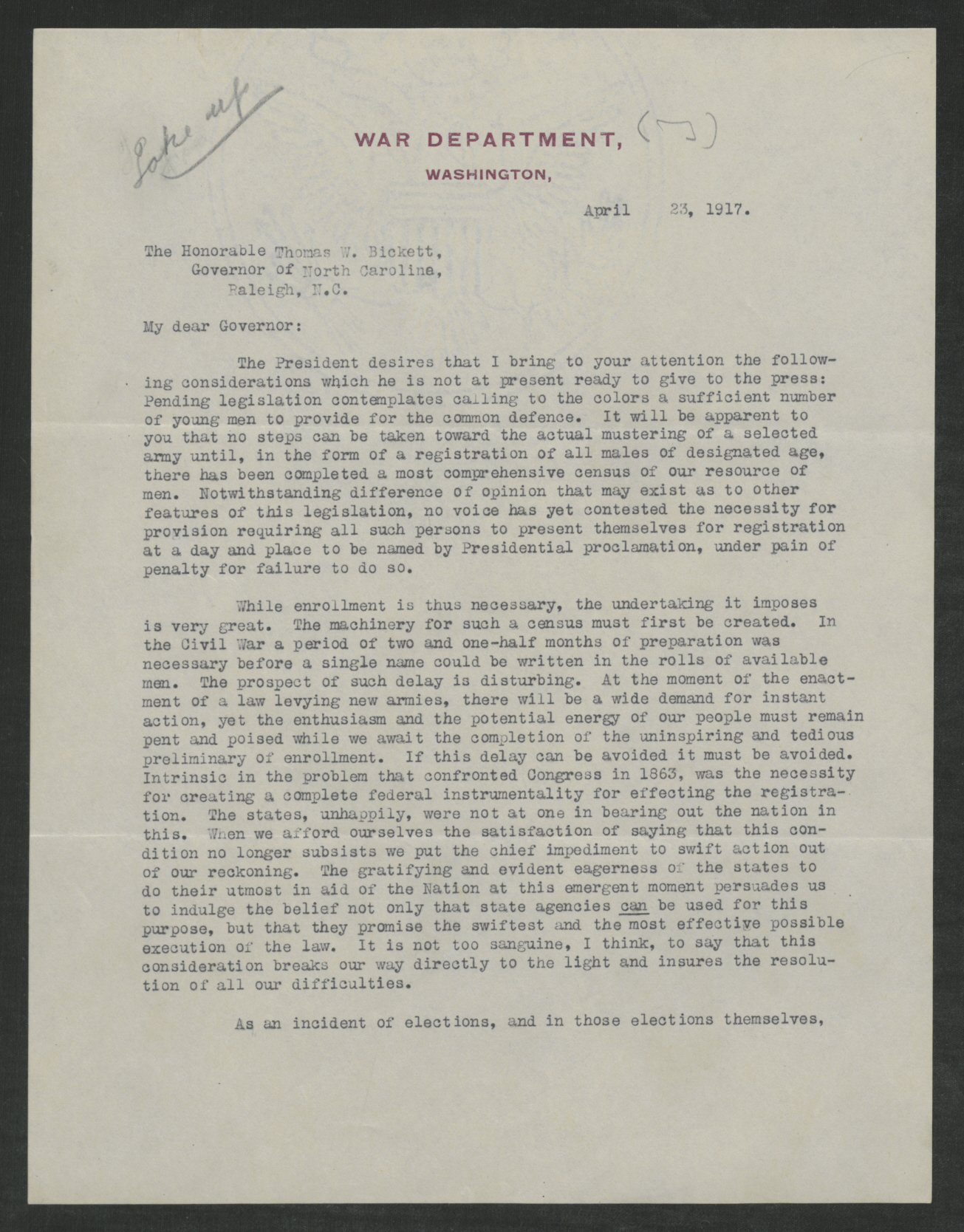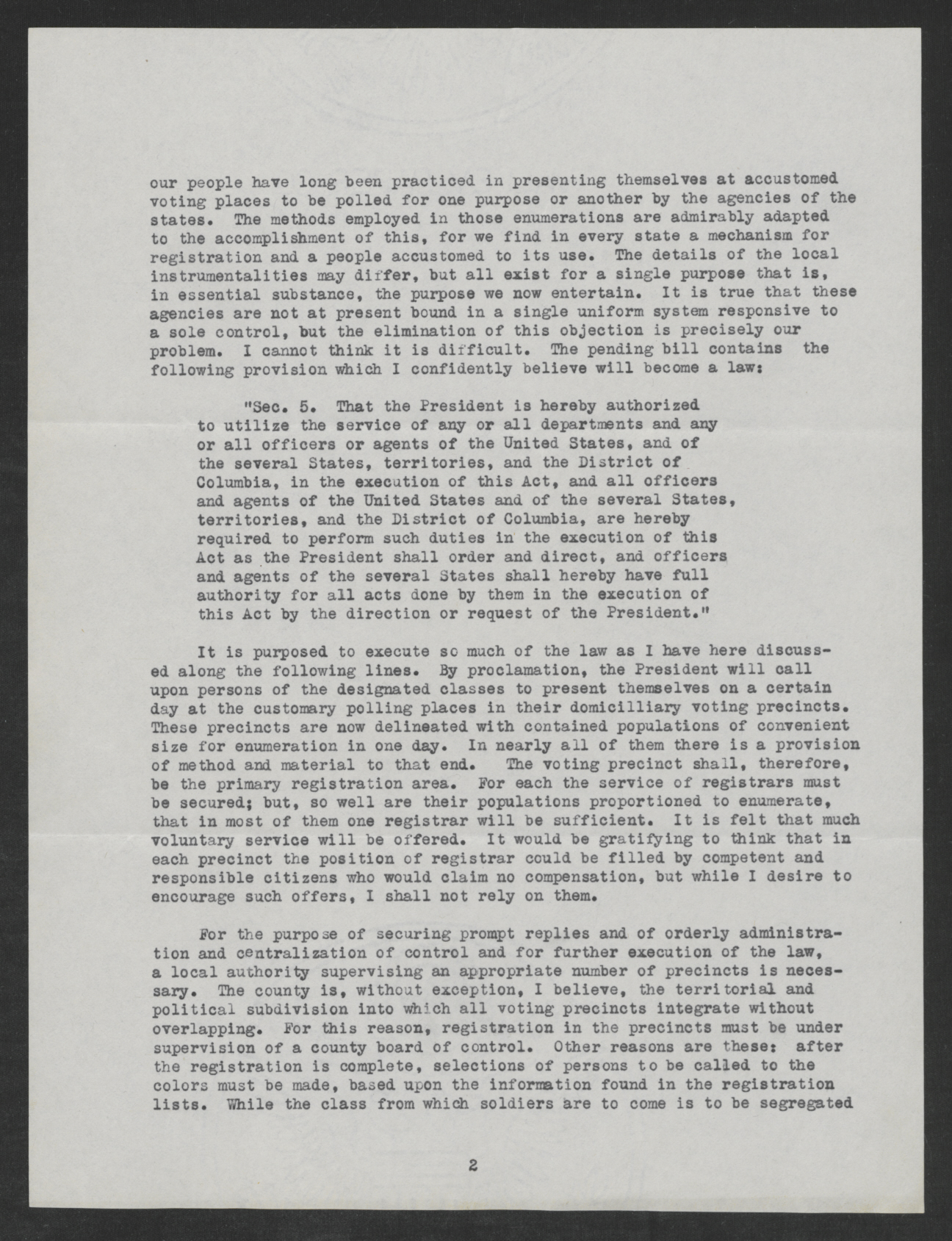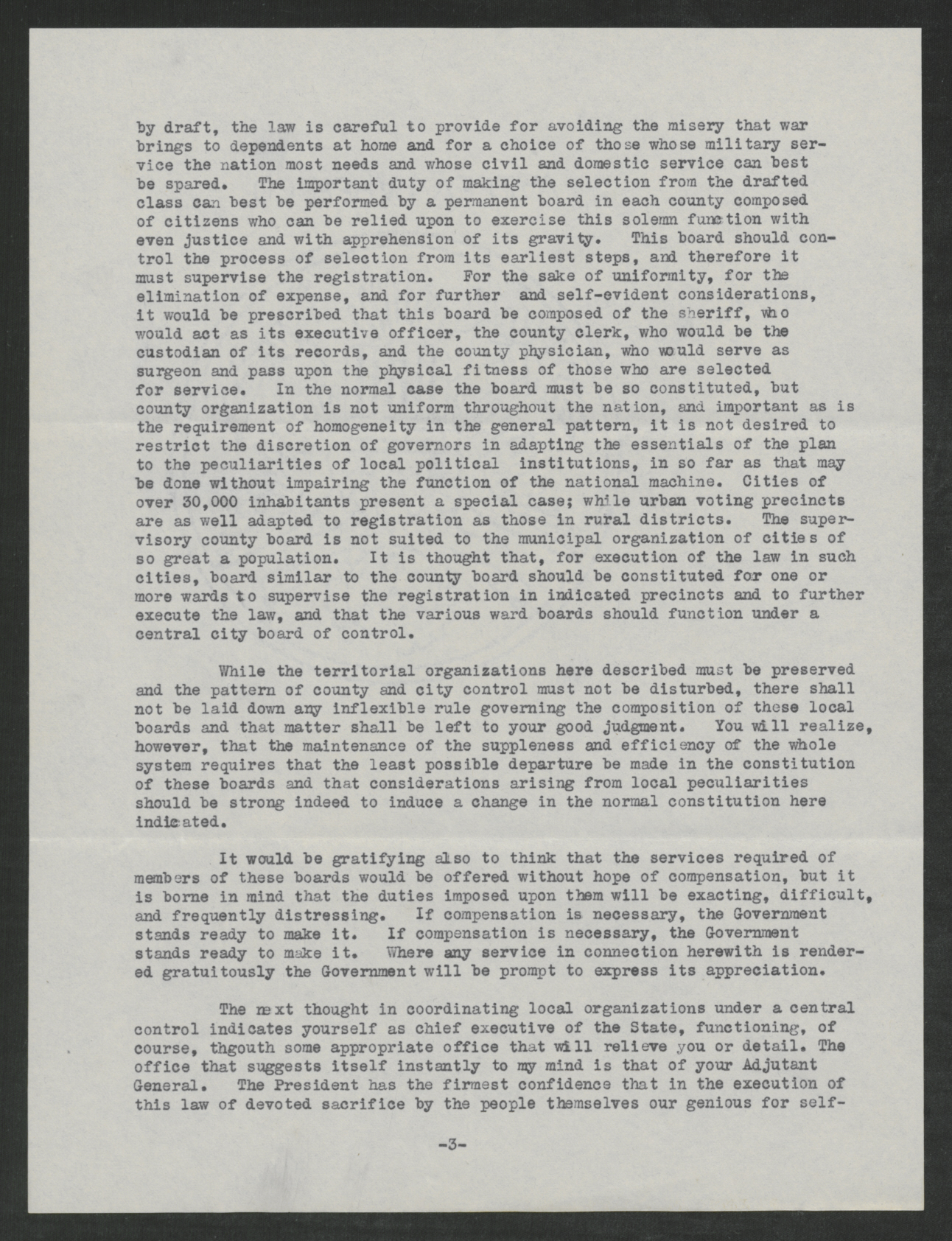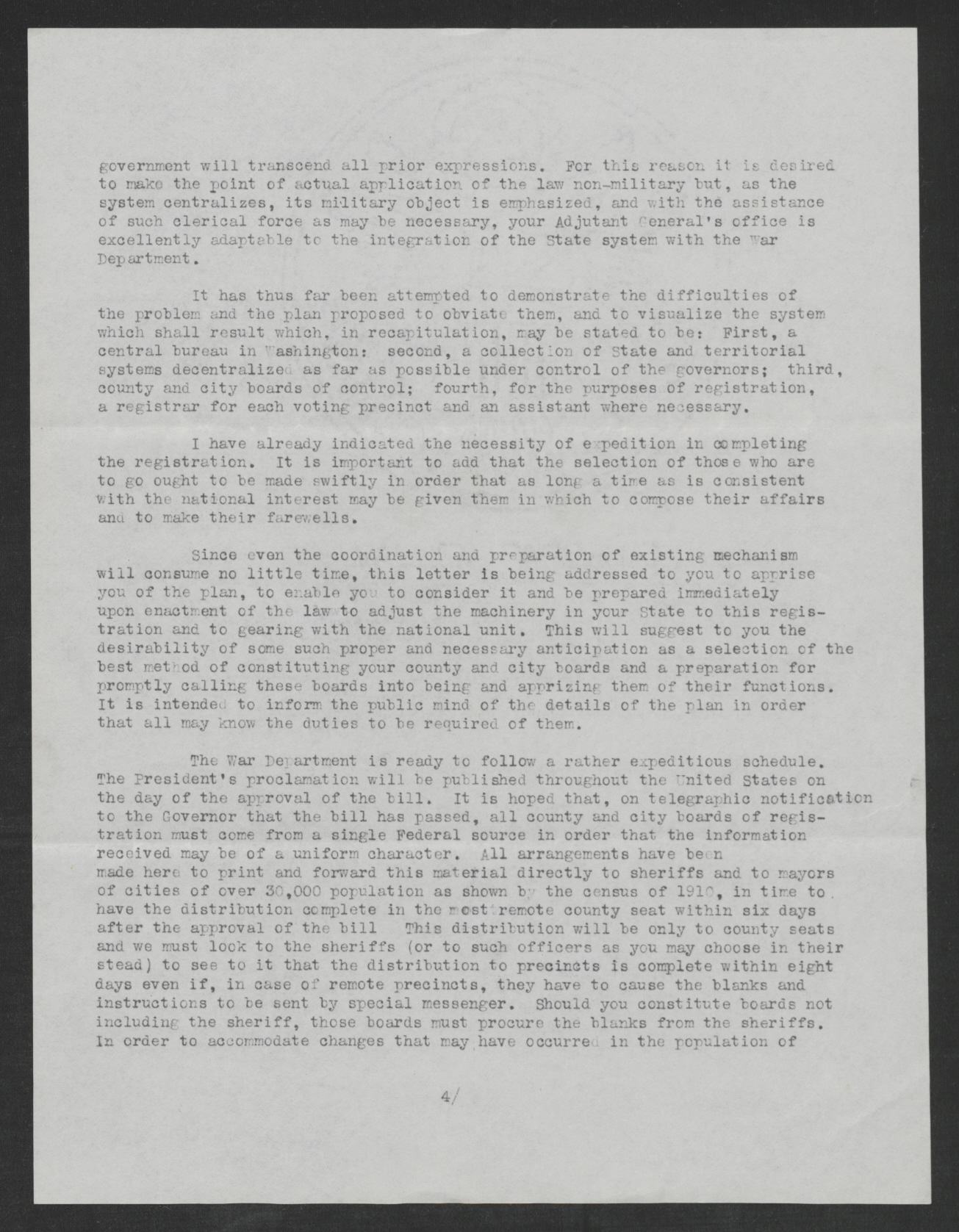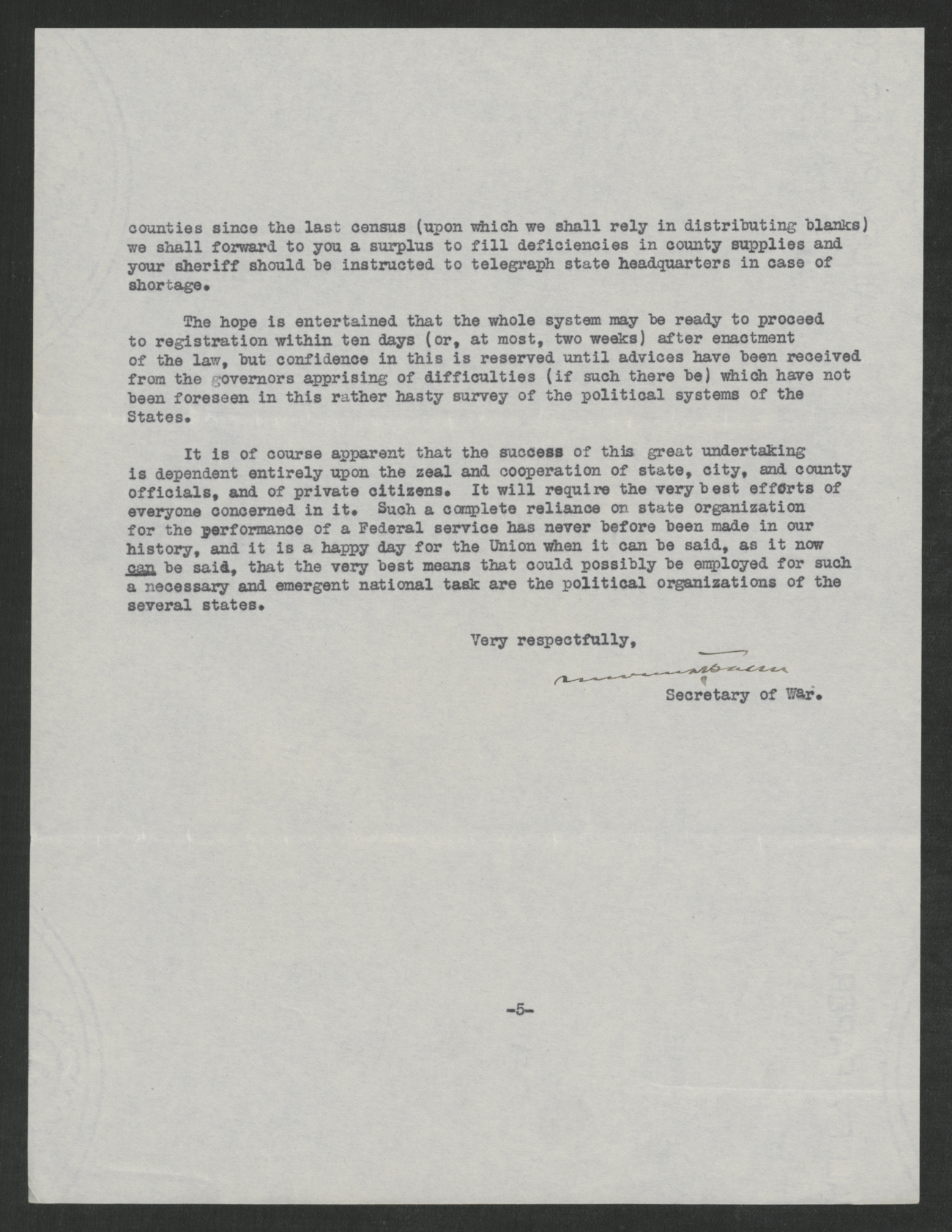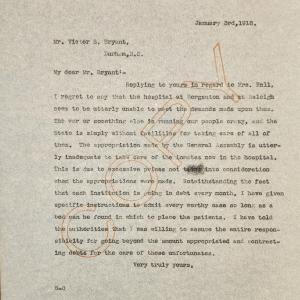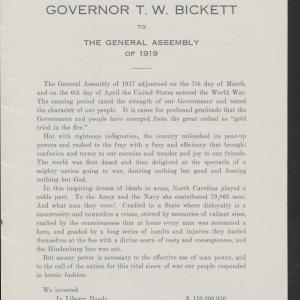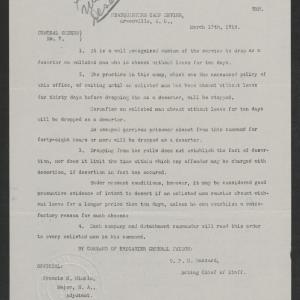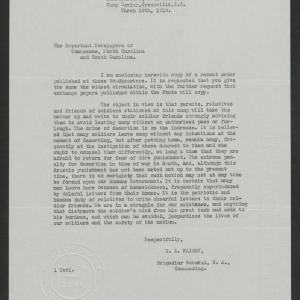<Take up>
WAR DEPARTMENT,
WASHINGTON,
April 23, 1917.
The Honorable Thomas W. Bickett,
Governor of North Carolina,
Raleigh, N.C.
My dear Governor:
The President desires that I bring to your attention the following considerations which he is not at present ready to give to the press: Pending legislation contemplates calling to the colors a sufficient number of young men to provide for the common defence. It will be apparent to you that no steps can be taken toward the actual mustering of a selected army until, in the form of a registration of all males of designated age, there has been completed a most comprehensive census of our resource of men. Notwithstanding difference of opinion that may exist as to other features of this legislation, no voice has yet contested the necessity for provision requiring all such persons to present themselves for registration at a day and place to be named by Presidential proclamation, under pain of penalty for failure to do so.
While enrollment is thus necessary, the undertaking it imposes is very great. The machinery for such a census must first be created. In the Civil War a period of two and one-half months of preparation was necessary before a single name could be written in the rolls of available men. The prospect of such delay is disturbing. At the moment of the enactment of a law levying new armies, there will be a wide demand for instant action, yet the enthusiasm and the potential energy of our people must remain pent and poised while we await the completion of the uninspiring and tedious preliminary of enrollment. If this delay can be avoided it must be avoided. Intrinsic in the problem that confronted Congress in 1863, was the necessity for creating a complete federal instrumentality for effecting the registration. The states, unhappily, were not at one in bearing out the nation in this. When we afford ourselves the satisfaction of saying that this condition no longer subsists we put the chief impediment to swift action out of our reckoning. The gratifying and evident eagerness of the States to do their utmost in aid of the Nation at this emergent moment persuades us to indulge the belief not only that state agencies can be used for this purpose, but that they promise the swiftest and the most effective possible execution of the law. It is not too sanguine, I think, to say that this consideration breaks our way directly to the light and insures the resolution of all our difficulties.
As an incident of elections, and in those elections themselves, our people have long been practiced in presenting themselves at accustomed voting places to be polled for one purpose or another by the agencies of the states. The methods employed in those enumerations are admirably adapted to the accomplishment of this, for we find in every State a mechanism for registration and a people accustomed to its use. The details of the local instrumentalities may differ, but all exist for a single purpose that is, in essential substance, the purpose we now entertain. It is true that these agencies are not at present bound in a single uniform system responsive to a sole control, but the elimination of this objection is precisely our problem. I cannot think it is difficult. The pending bill contains the following provision, which I confidently believe will become a law:
“Section 5. That the President is hereby authorized to utilize the service of any or all departments and any or all officers or agents of the United States, and of the several States, territories, and the District of Columbia, in the execution of this Act, and all officers and agents of the United States and of the several States, territories, and the District of Columbia, are hereby required to perform such duties in the execution of this Act as the President shall order and direct, and officers and agents of the several States shall hereby have full authority for all acts done by them in the execution of this Act by the direction or request of the President.”
It is purposed to execute so much of the law as I have here discussed along the following lines. By proclamation, the President will call upon persons of the designated classes to present themselves on a certain day at the customary polling places in their domiciliary voting precincts. These precincts are now delineated with contained populations of convenient size for enumeration in one day. In nearly all of them there is a provision of method and material to that end. The voting precinct shall, therefore, be the primary registration area. For each the service of registrars must be secured; but, so well are their populations proportioned to enumerate, that in most of them one registrar will be sufficient. It is felt that much voluntary service will be offered. It would be gratifying to think that in each precinct the position of registrar could be filled by competent and responsible citizens who would claim no compensation, but while I desire to encourage such offers, I shall not rely on them.
For the purpose of securing prompt replies and of orderly administration and centralization of control and for further execution of the law, a local authority supervising an appropriate number of precincts is necessary. The county is, without exception, I believe, the territorial and political subdivision into which all voting precincts integrate without overlapping. For this reason, registration in the precincts must be under supervision of a county board of control. Other reasons are these: after the registration is complete, selections of persons to be called to the colors must be made, based upon the information found in the registration lists. While the class from which soldiers are to come is to be segregated by draft, the law is careful to provide for avoiding the misery that war brings to dependents at home and for a choice of those whose military service the nation most needs and whose civil and domestic service can best be spared. The important duty of making the selection from the drafted class can best be performed by a permanent board in each county composed of citizens who can be relied upon to exercise this solemn function with even justice and with apprehension of its gravity. This board should control the process of selection from its earliest steps, and therefore it must supervise the registration. For the sake of uniformity, for the elimination of expense, and for further and self-evident considerations, it would be prescribed that this board be composed of the sheriff, who would act as its executive officer, the county clerk, who would be the custodian of its records, and the county physician, who would serve as surgeon and pass upon the physical fitness of those who are selected for service. In the normal case the board must be so constituted, but county organization is not uniform throughout the nation, and important as is the requirement of homogeneity in the general pattern, it is not desired to restrict the discretion of governors in adapting the essentials of the plan to the peculiarities of local political institutions, in so far as that may be done without impairing the function of the national machine. Cities of over 30,000 inhabitants present a special case; while urban voting precincts are as well adapted to registration as those in rural districts. The supervisory county board is not suited to the municipal organization of cities of so great a population. It is thought that, for the execution of the law in such cities, board similar to the county board should be constituted for one or more wards to supervise the registration in indicated precincts and to further execute the law, and that the various ward boards should function under a central city board of control.
While the territorial organizations here described must be preserved and the pattern of county and city control must not be disturbed, there shall not be laid down any inflexible rule governing the composition of those local boards and that matter shall be left to your good judgment. You will realize, however, that the maintenance of the suppleness and efficiency of the whole system requires that the least possible departure be made in the constitution of these boards and that considerations arising from local peculiarities should be strong indeed to induce a change in the normal constitution here indicated.
It would be gratifying also to think that the services required of members of these boards would be offered without hope of compensation, but it is borne in mind that the duties imposed upon them will be exacting, difficult, and frequently distressing. If compensation is necessary, the Government stands ready to make it. If compensation is necessary, the Government stands ready to make it. Where any service in connection herewith is rendered gratuitously the Government will be prompt to express its appreciation.
The next thought in coordinating local organizations under a central control indicates yourself as chief executive of the State, functioning, of course, thgough some appropriate office that will relieve you of detail. The office that suggests itself instantly to my mind is that of your Adjutant General. The President has the firmest confidence that in the execution of this law of devoted sacrifice by the people themselves our genius for self-government will transcend all prior expressions. For this reason it is desired to make the point of actual application of the law non-military but, as the system centralizes, its military object is emphasized, and with the assistance of such clerical force as may be necessary, your Adjutant General’s office is excellently adaptable to the integration of the State system with the War Department.
It has thus far been attempted to demonstrate the difficulties of the problem and the plan proposed to obviate them, and to visualize the system which shall result which, in recapitulation, may be stated to be: First, a central bureau in Washington; second, a collection of State and territorial systems decentralized as far as possible under control of the governors; third, county and city boards of control; fourth, for the purpose of registration, a registrar for each voting precinct and an assistant where necessary.
I have already indicated the necessity of expedition in completing the registration. It is important to add that the selection of those who are to go ought to be made swiftly in order that as long a time as is consistent with the national interest may be given them in which to compose their affairs and to make their farewells.
Since even the coordination and preparation of existing mechanism will consume no little time, this letter is being addressed to you to apprise you of the plan, to enable you to consider it and be prepared immediately upon enactment of the law to adjust the machinery in your State to this registration and to gearing with the national unit. This will suggest to you the desirability of some such proper and necessary anticipation as a selection of the best method of constituting your county and city boards and a preparation for promptly calling these boards into being and apprizing them of their functions. It is intended to inform the public mind of the details of the plan in order that all may know the duties to be required of them.
The War Department is ready to follow a rather expeditious schedule. The President’s proclamation will be published throughout the United States on the day of the approval of the bill. It is hoped that, on telegraphic notification to the Governor that the bill has passed, all county and city boards of registration must come from a single Federal source in order that the information received may be of a uniform character. All arrangements have been made here to print and forward this material directly to sheriffs and to mayors of cities of over 30,000 population as shown by the census of 1910, in time to have the distribution complete in the most remote county seat within six days after the approval of the bill. This distribution will be only to county seats and we must look to the sheriffs (or to such officers as you may choose in their stead) to see to it that the distribution to precincts is complete within eight days even if, in case of remote precincts, they have to cause the blanks and instructions to be sent by special messenger. Should you constitute boards not including the sheriff, those boards must procure the blanks from the sheriffs. In order to accommodate changes that may have occurred in the population of counties since the last census (upon which we shall rely in distributing blanks) we shall forward to you a surplus to fill deficiencies in county supplies and your sheriff should be instructed to telegraph state headquarters in case of shortage.
The hope is entertained that the whole system may be ready to proceed to registration within ten days (or, at most, two weeks) after enactment of the law, but confidence in this is reserved until advices have been received from the governors apprising of difficulties (if such there be) which have not been foreseen in this rather hasty survey of the political systems of the States.
It is of course apparent that the success of this great undertaking is dependent entirely upon the zeal and cooperation of state, city, and county officials, and of private citizens. It will require the very best efforts of everyone concerned in it. Such a complete reliance on state organization for the performance of a Federal service has never before been made in our history, and it is a happy day for the Union when it can be said, as it now can be said, that the very best means that could possibly be employed for such a necessary and emergent national task are the political organizations of the several States.
Very respectfully,
Newton D. Baker
Secretary of War.
Date:
Sender:
Recipient:
Repository:
Collection:
Places:
»» »» Washington, D.C.

